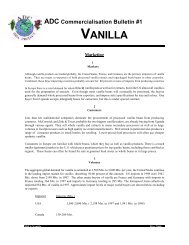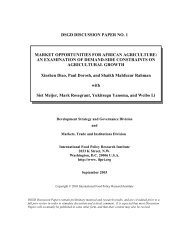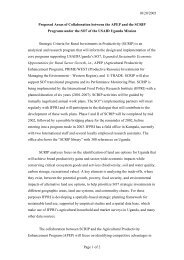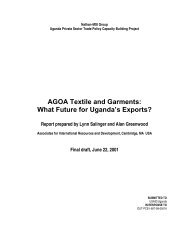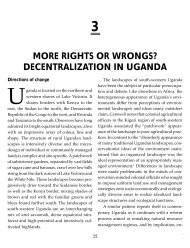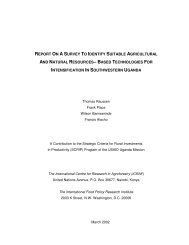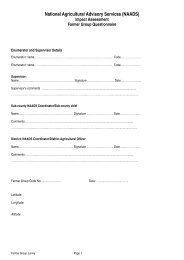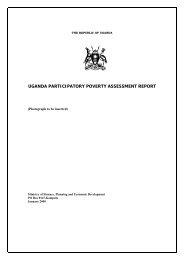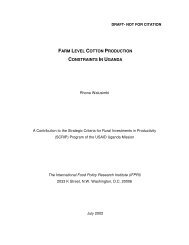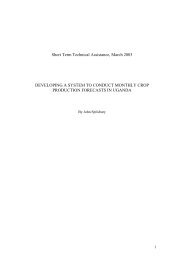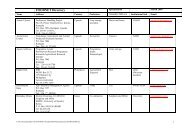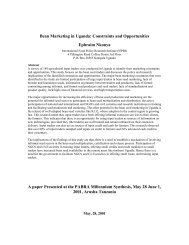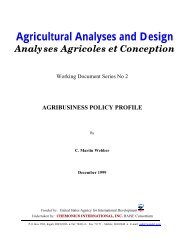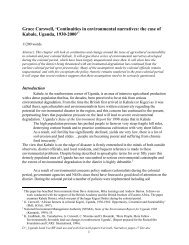Strategy for agricultural marketing and agro-processing ... - Foodnet
Strategy for agricultural marketing and agro-processing ... - Foodnet
Strategy for agricultural marketing and agro-processing ... - Foodnet
You also want an ePaper? Increase the reach of your titles
YUMPU automatically turns print PDFs into web optimized ePapers that Google loves.
Such a high level of support at a time of declining terms of trade poses serious questions as to the<br />
medium-term outlook <strong>for</strong> the economy <strong>and</strong> also underlines the importance <strong>and</strong> urgency of<br />
making the <strong>agricultural</strong> sector more competitive. In order to do this, a number of constraints<br />
currently affecting the <strong>marketing</strong> of <strong>agricultural</strong> produce need to be overcome. These are<br />
detailed below, while the ef<strong>for</strong>ts being made to tackle them (or those which it is proposed be<br />
initiated), are enumerated in Section 4.<br />
(i) Limited national capacity to negotiate in international trade <strong>for</strong>a <strong>and</strong> to analyse trade issues<br />
Ug<strong>and</strong>a is often inadequately represented at the WTO <strong>and</strong> in other multilateral <strong>and</strong> bilateral trade<br />
talks. Moreover, it lacks the capacity to research <strong>and</strong> analyse important <strong>and</strong> highly complex<br />
international trade issues, to develop negotiating positions <strong>and</strong> to respond quickly <strong>and</strong> effectively<br />
to the varied needs of Ug<strong>and</strong>a’s trade negotiating teams. There are also some difficulties<br />
experienced in the flow of in<strong>for</strong>mation between the key ministries involved with the<br />
development of national trade policy, particularly since separate ministries are responsible <strong>for</strong><br />
different trade agreement negotiations (For example, the Ministry of Finance, Planning <strong>and</strong><br />
Economic Development h<strong>and</strong>les EU trade-related matters, while WTO-related matters fall within<br />
the portfolio of the Ministry of Tourism, Trade <strong>and</strong> Industry). At the same time, problems have<br />
been experienced in links between Kampala <strong>and</strong> the Ug<strong>and</strong>an government’s trade negotiating<br />
teams abroad.<br />
These problems need to be addressed as a matter of urgency, particularly in light of the ongoing<br />
Doha round of (WTO) trade talks which is focussing on greater inclusion of developing country<br />
interests <strong>and</strong> may take into account proposals associated with the “Development Box” <strong>and</strong> other<br />
non-trade issues proposed by developing countries. Similarly, there are many issues relating to<br />
the AGOA Treaty, the EU’s Everything-But-Arms Agreement <strong>and</strong> NEPAD, that require careful<br />
negotiation <strong>and</strong> partnership-building if Ug<strong>and</strong>a is to capitalise fully on the potential opportunities<br />
they offer.<br />
(ii) Marketing <strong>and</strong> trade finance shortcomings<br />
The high cost of funds <strong>and</strong> the lack of long-term finance that are a perennial complaint among<br />
the business community particularly in the rural areas, severely constrain investment in<br />
<strong>marketing</strong>, <strong>processing</strong> <strong>and</strong> trade in the agriculture <strong>and</strong> fisheries sectors. Innovative methods are<br />
required to stimulate greater entrepreneurship <strong>and</strong> to facilitate enterprise development in the rural<br />
areas by making such finance more readily available.<br />
(iii) Lack of market in<strong>for</strong>mation<br />
There is a general absence of objective, reliable <strong>and</strong> regular in<strong>for</strong>mation available on the<br />
quantities, prices <strong>and</strong> trends in <strong>agricultural</strong> production (principally on food crops <strong>and</strong> livestock),<br />
<strong>for</strong> use by both the farming <strong>and</strong> <strong>agricultural</strong> trade communities throughout the country. Such<br />
in<strong>for</strong>mation needs to be made available to farmers in a <strong>for</strong>m that they can underst<strong>and</strong> <strong>and</strong> act<br />
upon if they are to be able to benefit fully from available markets (thus increasing their net<br />
returns <strong>and</strong> reducing the amount of produce wasted). Enabling farmers to appreciate <strong>and</strong><br />
maximise gains from market in<strong>for</strong>mation requires that farmers are organised <strong>and</strong> educated such<br />
that they are able effectively to engage in the liberalised market economy <strong>and</strong> there<strong>for</strong>e to use<br />
market in<strong>for</strong>mation as part of their <strong>marketing</strong> mix <strong>and</strong> analysis. Market in<strong>for</strong>mation also needs<br />
to be provided if consumers are to reap the full benefit that would result from an efficient crop<br />
<strong>and</strong> livestock <strong>marketing</strong> network.<br />
It is also undoubtedly true that the level of underst<strong>and</strong>ing of national <strong>and</strong> international<br />
<strong>agricultural</strong> <strong>marketing</strong> issues is low amongst those involved in the trade <strong>and</strong> in <strong>agricultural</strong><br />
5



